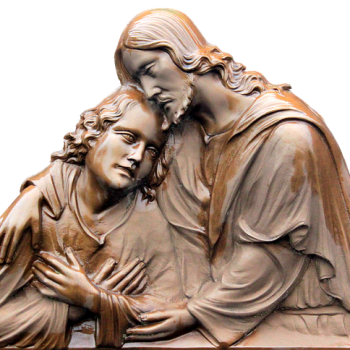Catholics are entering a three-year period of reflection and education concerning the Eucharist. At the same time, our beliefs and our properties are being attacked by fanatics. Looks like it is time to hunker down together to take stock.
The Church has stood steadfast in its teachings despite likely every generation asking for exceptions on one moral quandary after another. That’s because morality doesn’t change, and the Church is responsible for keeping us true to Gods commandments.
As discussed in a previous blog, our institutional understanding of the Bible changes over time as Christians mature in the faith. As God’s children, we are always learning and growing, and like children, we need supervision. https://www.patheos.com/blogs/musingsfromthepew/2022/02/the-development-of-doctrine-incremental-understanding/
To accept supervision and submit to the lessons takes some humility. It requires trust. You have to be willing to admit that you don’t know it all and that others may have educated opinions worth considering.
At this critical time, each of us needs to ask ourselves, “Have I grown in my faith and in the understanding of my faith?” Have I changed my beliefs because of secular pressures instead of staying committed to Catholic teaching?
Lessons in Trust
As the Bible says in Proverbs 3:5-6: “Trust in the Lord with all your heart and lean not on your own understanding.” That is, be humble and place your trust in God’s wisdom, not on your own.

In addition, Titus 1:9 says: “He must hold firmly to the trustworthy message as it has been taught, so that he can encourage others by sound doctrine and refute those who oppose it.” In other words, know your stuff, so you can defend your faith with confidence.
St. Ignatius Loyola, founder of the Jesuit order, taught in his Spiritual Exercises that good Christians should be “more ready to put a good interpretation on another’s statement than to condemn it as false.”
That’s a good suggestion for life in general, but also for accepting what the Church is teaching. Although trust in Church hierarchy has been damaged by the sex abuse scandal, that mistrust shouldn’t be applied to Catholic principles.
After all, the current bishops and priests who messed up did not create the doctrines of the Church. This scandal is just one more phase of wrongdoing in 2,000 years of ups and downs with good and bad clergy. Meantime, Catholicism itself has stayed the course.
Regardless of the issue, what matters is the Bible, the catechism, the sacraments, and the Mass. That is the core of our faith, so that is where we need to be knowledgeable and understand their purpose and truth. (See: https://www.patheos.com/blogs/musingsfromthepew/2021/08/why-we-remain-catholic/).
Built on Trust and Continuity
When Jesus instructed Peter to build His Church, Jesus was certifying that the Church speaks for Him. Throughout the centuries, the building process has involved serious theological study and the examples and writings of the saints.
That lengthy, scholarly process is worthy of our trust. It ought to make us question whether we have misunderstood Church positions on which we think we disagree. That would be easy enough to do considering the unreliability of the press.
For example, does the Catholic Church really want to control women’s bodies or is that just an accusation thrown out by abortion propaganda? Has the Church ever said anything but “respect life” and pledged to provide aid to mothers and their children?
Who has done better for women—the pro-abortion activists who provide abortions (at a profit) and little else, or the Church with multiple programs giving millions of dollars of assistance to pregnant women and babies?

Maybe Catholics need to give their own Church a break and listen for a while. Participation in the Eucharistic Renewal is critical. Our problems can’t be solved if we don’t all make an honest attempt to reconcile and evaluate.
As a church pianist, I am often struck by the lyrics of the songs. My sheet music is labeled by category, and under “Trust” there are many that deal with trusting God that could just as easily be read as trusting the Church.
“You [the Church] guard me from the foe, and you lead me in ways everlasting.” (“You Are Near”)
“[The church] Our shelter from the stormy blast, and our eternal home.” (“O God Our Help in Ages Past”)
“Tis grace [the Church] has brought me safe thus far, and grace will lead me home.” (“Amazing Grace”)
“A Mighty Fortress Is Our God [Church], His [Its] bulwark never failing.” (A Mighty Fortress”).
My plea to my Catholic brothers and sisters is “Trust the Church.” Look past the bureaucracy and that priest who hurt your feelings. Reach out for understanding. You will receive comfort, joy and wisdom in abundance.












